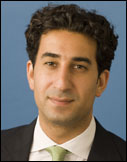Source: Testimony before the House Oversight Committee's National Security and Foreign Affairs Subcommittee
 On October 30, 2007, Carnegie's Karim Sadjadpour testified before the Subcommittee on National Security and Foreign Affairs at a hearing on "Iran: Reality, Opinions, and Consequences.”
On October 30, 2007, Carnegie's Karim Sadjadpour testified before the Subcommittee on National Security and Foreign Affairs at a hearing on "Iran: Reality, Opinions, and Consequences.”
Click on the PDF icon above to read Sadjadpour's written testimony.
![]() Event Video and Podcast
Event Video and Podcast
To view this video, you will need Windows Media Player, or QuickTime.
Download Windows Media Player
Download QuickTime
Click on one of the options below to watch video or listen to audio of the hearing:
Sadjadpour explained the views of the Iranian people and the effect those views have on Iranian and U.S. foreign policy. He made the following points:
- The discontent in Iran is deeply felt, widespread, and largely economic, but factors such as the Iraq war have tempered Iranian desire for abrupt change.
- Tehran is not a microcosm of Iran.
- Iranian President Mahmoud Ahmadinejad has failed to deliver on campaign promises, but his fate is uncertain.
- The degree of popular support for the nuclear issue has been exaggerated.
- The government’s enmity toward the U.S. and Israel doesn’t resonate on the Iranian street, but the U.S. has lost political capital among Iranians.
- The Iranian public has little impact on the country’s foreign policy.
Outlining the implications for U.S. foreign policy he said:
- In the current climate, U.S. democracy promotion efforts have been unconstructive and counterproductive.
- Objective, professional, Persian-language news sources would be well-received in Iran.
- A sudden upheaval or abrupt political change is unlikely to be for the better.
- The United States should make it clear that it has no intention of undermining Iran’s territorial integrity.
- Altering democracy promotion efforts does not mean indifference to human rights abuses.







